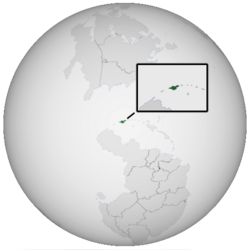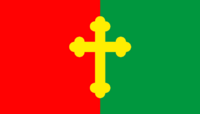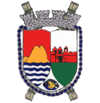Jaragua (Elparia)
Jaraguan Republic Republic Jaraguano | |
|---|---|
| Motto: "Revolution nyah sleep
(Revolution never sleeps)" | |
| Anthem: ¡Onward! | |
 | |
| Capital | Spira |
| Largest | Branton |
| Official languages | Jaraguan |
| Recognised national languages | Arellian |
| Recognised regional languages | Inner Jaraguan, Galician |
| Religion |
|
| Demonym(s) | Jaraguan |
| Government | Unitary one-party republic under an autocratic hereditary dictatorship |
• First Director | Barrington Mendez |
• Second Director | Edmundo Castillo |
| Legislature | National Directorate |
| Presidium | |
| Chamber of Directors | |
| Independence from Arells (Elparia) | |
• Independence Declared | 29 May 1927 |
• First Republic | 1 March 1947 |
• Military Government | 8 April 1966 |
• Revolutionary Government | 15 January 1970 |
• Second Republic | 31 December 1979 |
| Population | |
• 2023 estimate | 1,720,273 (78th) |
• 2018 census | 1,678,591 |
| GDP (nominal) | 2023 estimate |
• Total | $30 billion (64th) |
• Per capita | $17,712 (36th) |
| Gini (2020) | 39.6 medium |
| HDI (2022) | .808 very high (44th) |
| Currency | Jaraguan Peso ($) (JP) |
| Date format | dd/mm/yy |
| Driving side | right |
| Calling code | +13 |
| Internet TLD | .ja |
Jaragua, officially the Jaraguan Republic, is an island country comprising the island of Jaragua and several small islands and cays off its coast. It is located within the Coltegan Passage in the Tainean.
From the 1500s to the 1900s, Jaragua was colonized by the Galicians before being inherited by the Olympians and eventually taken over by the Arellians. It achieved its independence in 1927. In 1947, the First Republic was founded. Following a military takeover in 1966, instability and corruption became rampant. The December Revolution toppled the military government and the Revolutionary People's Council took control of the country in 1970 under the leadership of Michael Mendez.
Jaragua is a totalitarian dictatorship with a comprehensive 'cult of the party' as described by political analysts. Freedom International labeled the country as a 'police state'. Despite this label, the country remains an extremely popular tourist destination and is also known for its booming marijuana industry. Local elections are sometimes held but only at the discretion of the state (usually every 4-5 years). With the most churches per square kilometer, Jaragua is oftentimes considered the most Christian country in Elparia. Laws against sacrilege are strictly enforced. Jaragua is called the "world's smallest cultural power" due to the impact of reggae, as well as the "weed capital" of the world. The country is led by Barrington Mendez, son of Michael Mendez, who is regarded as the "father of the revolution". Due in part to its size, Jaragua hosts one of the most advanced cybernetic economies in Elparia.
Etymology
The indigenous people, the Emiyit, called the island Sharaka in their language, meaning the "Land of Wood and Water" or the "Land of Springs". Colloquially, Jaraguans refer to their home island as "Jara". Slang names such as "Jar", "Jarland", "Yanya" in Jaraguan, or briefly "Ja", have derived from this.
History
Prehistory
Galician rule (1509-1812)
The first Galician settlement on the island was Saria, which was established in 1509 by Carlos Vasquez. The capital was moved to Nuevo Tepro in 1535. Meanwhile, natives began dying in large numbers, both from disease and enslavement by the Olympians.
During the 1700s the economy boomed, based largely on sugar and other crops for export such as coffee, cotton and indigo. All these crops were worked by black slaves, who lived short and often brutal lives with no rights, being the property of a small planter-class. In the 18th century, slaves ran away and joined the Maroons in increasing numbers, and resulted in The First Maroon War (1728 – 1739/40), which ended in stalemate. The Galician colonial authority sued for peace, and signed treaties with the Eastern Maroons led by Jajoe and Hunnapeng in 1739.
Though often thought to have been extinct following contact with colonists, the natives still inhabited the island when the Galicians surveyed the countryside in 1802. Most fled into the interior regions, merging with the maroon communities.
Olympian rule (1812-1864)
After Olympia gained independence, Jaragua became a colony of Olympia, as the colonial government (dominated by Olympians at the time) opted for it. Initially, not much changed from Galician rule except the official flag, which had the Galician flag exchanged for the Olympian one. Galician loyalists fled back to Galicia. From 1813 onward, Jaragua became a popular destination for Arellians seeking land. They were welcomed by the colonial government, which was collecting increased amounts of tax money due to increased Arellian immigration.
In 1821, Olympia pressured the colonial government to cease all treaties with the maroons and expand into their territory. The colonial government reluctantly obliged, causing mayhem in northern and western settlements as maroons pillaged towns and freed slaves. This escalated into a full on slave revolt in 1822, which by 1834 had nearly bankrupted the colonial government. Olympia made Jaragua a core territory in 1835 and sued for peace with the maroons, with whom they reached an agreement the Treaty of Port Ockton the next year in 1836. From 1836 to 1864, Arellians continued to purchase land and plantations as Arellian companies bailed out the colonial government.
Arellian rule (1864-1927)
In 1864, the Arellian Empire invaded Jaragua during its war with Olympia. As Olympian slave owners began to flee, they freed their slaves, who fled to the countryside to join the well-established maroon communities. Slavery was officially abolished in 1878 after the Arellians secured the island under their administration, although conditions on the plantations essentially equated to slavery. While whites still made up the vast majority of plantation owners, there was a rise in black plantation owners after the abolition of slavery.
Post-independence (1927-1970)
After leaving the West Tainean Federation, Jaragua attained full independence on 29 May 1927. It retained the Arellian monarch as the country's head of state and adopted a Westminster-style parliamentary system. John Barante, aged 76, became the country's first prime minister. Up until 1947, a handful of prime ministers took power, all associated with the Jaraguan Labor Party.
On 1 March 1947, the population approved a referendum by over 90% to turn into a republic. Thus, the Republic of Jaragua was founded. The country abandoned the Westminster-style parliamentary system in favor of a semi-presidential system. The constitutional monarchy was abolished, however, the dominance of Arellian-born oligarchs actually strengthened over the next few years. The Jaraguan Labor Party split into the People's Social Party and the National Democratic Party in the same year. From 1947 to 1966, the People's Social Party, National Democratic Party, and Socialist Party all participated in a power struggle that oftentimes resulted in armed conflict in the streets of Branton. Gangs associated with either party would vandalize property and intimidate voters.
General Aaron Smith staged a coup d'etat on 8 April 1966, citing an "emergency situation" due to the rise of radical factions within the military and alleged communist subversion. The military government was viewed with fondness by the oligarchs, who were promised protection by Smith's government in exchange for funding and land usage rights for the military. The four-year military government is noted for its tremendous corruption issues, facilitating a "culture of embezzlement" among officials. Much of the military, especially those that were black, would end up siding with the revolutionaries in the December Revolution.
Smith's government banned the Socialist Party and heavily persecuted the top members of the People's Social Party. The National Democratic Party underwent a purge of disloyal factions and was made a rubber stamp tool of the regime. Aaron Smith was a mulatto, and thus, attempted to use his mixed heritage to appeal to both the white elite and black majority.
Early revolutionary era (1970-1985)
The Revolutionary Government was proclaimed on 15 January 1970 after the radical Revolutionary People's Council, led by Michael Mendez, overthrew the military government in a revolution, making Jaragua the first revolutionary state in the Tainean. The Revolutionary Government was formed as an emergency government against "domestic forces of political, cultural, and economic degradation" to "save civil society". A few days after taking power, the constitution was suspended and the elections set for later in the month were canceled. The RPC received broad support from the population, the majority of whom grew tired of rampant corruption under the military government. Many young people joined the new revolutionary army to carry out patrols and assist with government initiatives.
During the period, the Revolutionary Government carried out an organized persecution of plantation owners, landlords, oligarchs, and vodou practitioners. Temples were oftentimes converted into churches and cleansed of their unholiness by the blessings of priests. Persecuted groups were subject to public humiliation, denounced by crowds of fervent sympathizers to the revolution. They were then shipped to the countryside to work in 'reeducation camps' where they were made to do forced labor and renounce their old ways. Foreign assets were nationalized along with all primary industries, which were relegated to directorates (state-owned companies).
The Cyberlogic Program was announced on 29 June 1974 alongside the creation of the Cyberlogic Directorate. Implementation began a couple months later in August. Over the next few years, the government imported computer terminals and brought telex machines and fax machines into workplaces. Construction centers, engineering centers, and certain types of standard workplaces were consolidated and expanded by the Chamber of Directors.
On 4 April 1976, forces within the party led by George Jackson (then Director of Finance) attempted a coup d'etat on Mendez's government. Mendez was hit by a bullet in the chest and survived. Within an hour, the plotters were subdued and arrested. They were found guilty of high treason and sentenced to death by firing squad. It is reported that they endured days of torture prior to their execution, although, there has been no evidence found by the U.N. Following his immediate recovery and return to politics, Mendez began to be referred to as Father Mendez by his supporters.
Father Mendez's later rule (1985-2001)
On 16 October 1985, Mendez suffered a stroke during an inspection of the Education Directorate. He survived but became increasingly paranoid following the incident. He made his son, then aged 24, Second Director in 1986. Most of Mendez's attention was set on the implementation of the Cyberlogic Program, and thus, he wasn't seen in public much for many years. His wife, son, and daughter were tasked with inspections and economic management under his guidance. His son came to be known as Uncle Mendez by the general populace.
During the revolution, the land seized from plantation owners was nationalized by the state and managed by appointees of the Agricultural Directorate. In 1980, only 15% had been collectivized. After labeling the managerial system as "wholly inefficient" following a series of inspections in 1981, Mendez sought to collectivize all farmland in the country in order to increase productivity. The process was highly procedural, done slowly and carefully so as to not upset the balance of the economy and allow farmers to get used to the cooperative model. By 1994, all state-owned farmland was collectivized. All farmers were given stake in the farm as well as relatively decent housing, commonly referred to as Mendezvilles.
The government introduced the Planned Market System in 1984. It has been described as a "phonebook economy". Services are made available to consumers by visiting or calling a distribution center, where they will refer to a state-mandated phonebook (or a menu if they are at the physical location) that will allow them to order products and services. This allowed for increased economic activity as well as increased control over economic activity by the government. It also incentivized employers to pay their taxes. This "phonebook economy" worked in tandem with the early Cyberlogic program.
In 1989, Mendez announced that every officially designated workplace in the country was connected to the Cyberlogic Program with its own terminal, fax machine, telex machine, and alternative means of communication. Massive strides were made to optimize infrastructure for cross-country shipping, with more paved roads around the country.
In 1991, Jaragua gained access to the world wide web, enforcing restrictions on usage.
Barrington era (2001-present)
Government and politics
The Revolutionary People's Council is the only legal party in Jaragua. Other political groups are not allowed to organize. The country is led by the First Director, who is appointed by the the RPC Congress every ten years, along with the Presidium of the Directorate, which is tasked with organizing sociopolitical and economic programs. The Chamber of Directors is formed by the directors of each state company, which have monopolies on respective industries.
Foreign relations
Jaragua has conducted foreign policy that is uncharacteristic of such a minor country. Since the 1990s, it has been involved in wars across the developing world, usually to support government forces.
Jaragua is officially a nonaligned country and maintains positive relations with most countries around the world. It has close relations with both Konzask and Treka, with a relatively large diaspora in Treka. It also retains positive diplomatic relations with all of its former colonizers. The country prefers to maintain trade relations with developing nations.
Relations with Essotori are somewhat tense, due to alleged attempts to "subvert Jaraguan sovereignty" in the past.
Military
The Revolutionary Army is the small but professional military force of Jaragua. It is officially the armed wing of the Revolutionary People's Council. Once chosen, officer candidates are sent for training in Treka or Konzask. Soldiers are made to pledge allegiance to the bible, just as party members are.
Law enforcement
All law enforcement agencies are maintained under the Internal Directorate, which works closely with the Revolutionary Army. The People's Security Agency, sometimes referred to as "8812", serves as the regime's secret police. In Jaragua, citizens can receive police assistance by dialing "111" on their phones.
Administrative divisions
Human rights
Economy
History
Cyberlogic program
Tourism
Infrastructure
Communication
Transport
The transport infrastructure in Jaragua consists of roadways, railways and air transport, with railways and roadways forming the backbone of the island's internal transport system. Jaraguan transport is heavily policed and it is rumored that the secret police is widespread in trains and the metro especially.
Roadways
Roadways are extensive, and due to the scarcity of cars in the Jaraguan market, traffic is virtually unheard of. Urban transportation is provided by a colorful selection of buses in each major city. All owned by the state-owned JaraguaTravel on paper, most bus transport is managed by franchise entities that compete with one another, while shuttles as well as some other buses are directly managed by the state.
Railways
Every major city is connected via rail. Due to its small size, Jaragua is able to maintain a relatively extensive rail network. Jaragua purchases and refurbishes used old train cars from other countries.
Air transport
There are three international airports in Jaragua with modern terminals, long runways, and the navigational equipment required to accommodate the large jet aircraft used in modern and air travel: Port Ockton International Airport, Spira-Branton International Airport, and the St. Moses Airport. An airport in Fort Senury also exists, but it is restricted to government officials only.
Branton Metro
Jaragua has a rapid transit system in the Branton Metropolitan Area, which covers Spira, which is itself essentially a suburb of Branton. It was finished in 2005 and built by Konzask.
Geography
Demographics
Culture
Media
Jaraguan media considered sacrilegious or dehumanizing is censored. Libraries are subsidized by the state and university students can access libraries for free.
There are a total of ten stations on Jaraguan TV, all of which are controlled by the state:
- Channel 1: Music
- Channel 2: Good Life (Preaching)
- Channel 3: Jaragua Today (Talk shows, movie reviews, game shows, drama)
- Channel 4: Adventurama Network (Kids' content)
- Channel 5: News Channel
- Channel 6: Yamo (Cinema)
- Channel 7: History Channel
- Channel 8: Sports Network
- Channel 9: Innovation Network (Science)
- Channel 10: Jaragua Nationwide (Submissions from amateurs)
The world wide web is accessible to Jaraguans, however, personal routers are not sold in the country. Homemade wi-fi towers are common among rural communities that don't have quick access to cafes or libraries. .jr is the Internet country code top level domain (TLD) for Jaragua. Registrations are at the third level beneath com.jr, net.jr, org.jr, edu.jr, dir.jr, info.jr, people.jr, music.jr, and bible.jr.
Cuisine
The island is famous for its Jaraguan jerk spice, curries and rice and peas which is integral to Jaraguan cuisine. Jaragua is also home to Red Stripe beer and Jaragua Blue Mountain Coffee.

